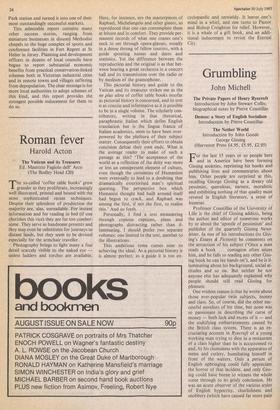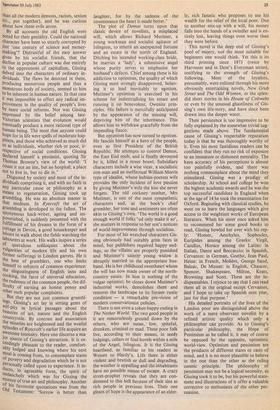Grumbling
John Michell
The Private Papers of Henry Ryecroft Introduction by John Stewart Collis; biographical notes by Pierre Coustillas Demos: a Story of English Socialism Introduction by Pierre Coustillas The Nether World Introduction by John Goode George Gissing (Harvester Press £4.95, £5.95, £2.95)
For the last 15 years or so people here and in America have been forming Gissing societies, reprinting his books and publishing lives and commentaries about him. Other people are surprised at this, recalling George Gissing as a dreary old pessimist, querulous, earnest, moralistic and exhibiting nothing of that quality most revered in English literature, a sense of humour.
Professor Coustillas of the University of Lille is the chief of Gissing addicts, being the author and editor of numerous works by or about the 'apostle of pessimism' and publisher of the quarterly Gissing News- letter. In one of his introductions (to Giss- ing's Essays & Fictions) he comments on the attraction of his subject (`Once a man reads a book ... contagion often seizes him, and he falls to reading any other Giss- ing book he can lay hands on'), and he is il- luminating about his background, social at- titudes and so on. But neither he nor anyone else has adequately explained why people should still read Gissing for pleasure.
One evident reason is that he wrote about those ever-popular twin subjects, money and class. So, of course, did the other suc- cessful novelists of his time, but none was so passionate in describing the curse of money — both lack and excess of it — and the stultifying embarrassments caused by the British class system. There is an ex- cruciating account in Ryecroft of a young working man trying to dine in a restaurant of a class higher than he is accustomed to and, by his clumsiness with the apparatus of menu and cutlery, humiliating himself in front of the waiters. Only a person of English upbringing could fully appreciate the horror of that incident, and only Giss- ing could have borne to witness the whole scene through to its grisly conclusion. He was an acute observer of the various styles of English hypocrisy, churlishness and snobbery (which have caused far more pain
than all the modern demons, racism, sexism etc., put together), and he was curious about how these evils arose.
By all accounts the old English were noted for their geniality. Could the national Character have been so utterly corrupted by just 'one century of science and money- making'? Distrustful of the easy answer given by his socialist friends, that the decline in popular culture was due entirely to the oppressions of capitalism, Gissing delved into the characters of ordinary in- dividuals. The flaws he detected in them, Producing monstrous people and thus a Monstrous body of society, seemed to him to be inherent in human nature. In that case it was impossible to effect any radical im- provement in the quality of people's lives by mere social reforms. Nor was Gissing impressed by the belief among late- Victorian scientists that evolution would eventually produce a more rational type of human being. The most that anyone could hope for in life were spells of moderate hap- piness, and those who achieved as much did so as individuals, whether rich or poor, ir- respective of social conditions. Gissing declared himself a pessimist, quoting Sir Thomas Browne's view of the world: '1 count it not an inn, but an hospital; a place not to live in, but to die in.' Disgusted by society and most of the in- dividuals comprising it, and with no faith in any particular cause or philosophy as a means to regeneration, Gissing took up grumbling. He was an absolute master in that medium. In Ryecroft the art of grumbling is developed to the fullest. The eP0nYmous hack-writer, ageing and im- Poverished, is suddenly presented with the fulfillment of his dreams in the form of a cottage in Devon, a good housekeeper and leisure to walk about the fields watching the labourers at work. His walks inspire a series of querulous soliloquies about the vulgarities of modern life and his own former sufferings in London garrets. He is the best of grumblers, one who limits himself to subjects of common experience: the disgustingness of English inns and cooking, the farce of universal education, the rudeness of the common people, the dif- ficulty of earning an honest penny and other such popular complaints. But they are not just common grumbl- ings. Gissing's art lay in setting gems of self-pity in lyrical passages about the beauties of art, nature and the .English countryside. By contrast and association the miseries are heightened and the woeful episodes of Ryecroft's earlier life acquire an awesome intensity. Here one discerns a ma- jor source of Gissing's attraction. It is ex- ceedingly pleasant to the reader, comfort- ably lodged and knowing where his next Meal is coming from, to contemplate states of poverty and degradation which he is not cPersonally called upon to experience. It in- duces, in agreeable form, the spirit of Melancholy which was for Gissing the essence of true art and philosophy. Another of his favourite quotations was from the Old Testament: 'Sorrow is better than
laughter, for by the sadness of the countenance the heart is made better.'
The plot of Demos turns upon that classic device of novelists, a misplaced will, which allows Richard Mutimer, a young workman and socialist agitator of Islington, to inherit an unexpected fortune and an estate in the north of England. Ditching his intended working-class bride, he marries a 'lady', a submissive angel whose purity serves to emphasise her husband's defects. Chief among these is his addiction to optimism, the quality of which Gissing most strongly disapproved, believ- ing it to lead inevitably to egotism. Mutimer's optimism is exercised in his scheme for industrialising his estate and running it on benevolent, Owenite prin- ciples. His failure is mercifully anticipated by the appearance of the missing will, depriving him of the inheritance. This allows him to withdraw gracefully from the impending fiasco.
But optimism has now turned to egotism. He fancies himself as a hero of the people, even as first President of the British Republic. He attempts to control Demos, the East End mob, and is finally devoured by it, killed in a street brawl. Subsidiary characters include a wise vicar, a socialistic con-man and an ineffectual William Morris type of idealist, whose lesbian-poetess wife provides the only incident of love passion by giving Mutimer's wife the kiss she never forgets. The old cockney mother, Mrs Mutimer, is one of the most sympathetic characters and, as the book's chief grumbler, her tone and sentiments are often akin to Gissing's own. `The world is a good enough world if folks 'ud only make it so', she mutters in response to her son's notions of world-improvement through socialism.
For most of his wretched characters Gis- sing obviously had suitably grim fates in mind, but publishers required happy end- ings, so the villains are properly punished and Mutimer's saintly young widow is abruptly married to the appropriate hus- band. He is her childhood sweetheart whom the will has now made owner of the north- country estate. In him is nothing of the vulgar optimist; he closes down Mutimer's industrial works, demolishes them and restores the landscape to its former rustic condition — a remarkable pre-vision of modern conservationist policies.
There is not even a token happy ending in The Nether World. The two good people in it are remorselessly ground down by the others, who are mean, low, spiteful, drunken, criminal or mad. These poor folk live, according to their means, in seedy lodgings, cellars or foul hovels within a mile of the Angel, Islington. It is the Gissing heartland, as familiar to his readers as Wessex to Hardy's. Life there is either violent and brutish or dull and degrading, the weather is appalling and the inhabitants have no possible means of escape. A crazy street-prophet reveals that they are con- demned to this hell because of their sins as rich people in previous lives. Their one gleam of hope is the appearance of an elder-
ly, rich fanatic who proposes to use his wealth for the relief of the local poor. Due to another mix-up with a will, his money falls into the hands of a swindler and is en- tirely lost, leaving things even worse than they were before.
This novel is the deep end of Gissing's pool of misery, not the most suitable for beginners one would think. Yet this is its third printing since 1973 (twice by Harvester and in Dent's Everyman series), testifying to the strength of Gissing's following. Most of the loyalists, presumably, were enlisted through his more obviously entertaining novels, New Grub Street and The Odd Women, or the splen- did short stories in his House of Cobwebs or even by the unusual ghastliness of Gis- sing's own life-story, and have since been drawn into the deeper water.
Their persistence is too impressive to be fully explained, by the somewhat trivial sug- gestions made above. The fundamental cause of Gissing's respectable reputation today is that he was thoroughly worthy of it. Even his most fastidious readers can be confident that they run no risk of exposure to an immature or dishonest mentality. The keen accuracy of his perceptions is almost too painfully evident, and there was nothing commonplace about the mind they stimulated. Gissing was a prodigy of scholarship. At school and college he won the highest academic awards and he was the top successful candidate in England when at the age of 14 he took the examination for Oxford. Beginning with classical studies, he went on to learn the languages which give access to the weightiest works of European literature. When his sister once asked him to recommend her some good books to read, Gissing bowled her over with his rep- ly: `Homer, Aeschylus, Sophocles, Euripides among the Greeks: Virgil, Catullus, Horace among the Latins: in Italian, Dante and Boccaccio: in Spanish, Cervantes: in German, Goethe, Jean Paul, Heine: in French, Moliere, George Sand, Balzac, De Musset: in English, Chaucer, Spencer, Shakespeare, Milton, Keats, Browning and Scott. These are the in- dispensables. I rejoice to say that I can read them all in the original except Cervantes, and I hope to take up Spanish next year, just for that purpose.'
His detailed portraits of the lives of the London poor are distinguished above the work of a mere observant novelist by a refined artistic quality which only a philosopher can provide. As to Gissing's particular philosophy, the Hope of Pessimism as he called it, it may of course be opposed by the opposite, optimistic world-view. Optimism and pessimism are the products of different states or casts of mind, and it is no more plausible to believe in the one than the other as the ruling cosmic principle. The philosophy of pessimism may not be a logical necessity, as Gissing took it to be, but his powerful state- ment and illustrations of it offer a valuable corrective to enthusiasts of the other per- suasion.







































 Previous page
Previous page